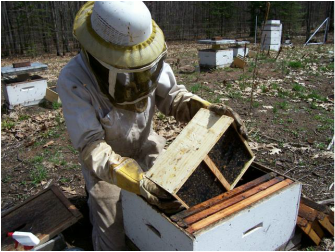
The screened 2# "packages" of honeybees (yep, they are sold by the pound!) arrive from California with their queen riding in a little cage suspended within. We spray them with sugar water, dump them package by package into empty hives, and release the queens. A small soy-protein patty is laid across the top bars of the combs as "bee bread" to substitute for pollen until local flowers are blooming. Over a hole in the center of the inner cover we place a half gallon pail of syrup. The cover of the pail has small holes, like a salt shaker, that retain the syrup in the inverted pail by surface tension, but allow the bees to draw out the "feed" using their hollow tongues as straws. The outer lid is placed on top of the pail to shed the rain and the bees are left to settle in for the night. By the following morning they will be re-orienting to their new surroundings.
I always imagine the bees--these small arrivals from California--appearing at the entrance of their new Wisconsin home in the morning wearing little sun glasses with a tiny surf board tucked under a wing, scratching their heads with the other wing as they look out at a field of snow wondering what happened to their beach! It must be a rude awakening!
Chris has been back working the farm for ten years now. He is no longer a novice, but a skilled beekeeper farmer. He has already hived five or six colonies by the time I get out to the yard.
"Going to get them all in tonight?," I ask.
"Got to." he replies not looking up from his work. "Thanks for coming out, Dad."
We bend to our task each knowing it well. Time is of the essence but we do not hurry. The work is steady but gentle. We work silently, neither having to instruct the other. There is no wasted movement. When we finish, the last colors of sunset are fading into dusk. Chris pops the tabs on a couple of cans and for a while longer we sit on the end-gate of the truck, contemplating our completed work and sipping beer--together.


 RSS Feed
RSS Feed
